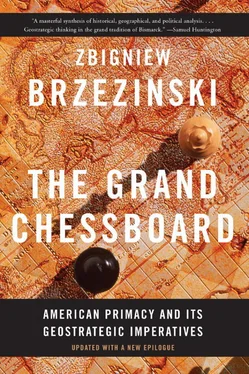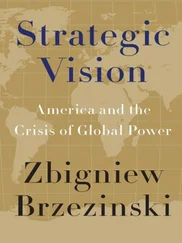The Continents: Area
The Continents: Population
The Continents: GNP
Stretching between the western and eastern extremities is a sparsely populated and currently politically fluid and organizationally fragmented vast middle space that was formerly occupied by a powerful rival to U.S. preeminence—a rival that was once committed to the goal of pushing America out of Eurasia. To the south of that large central Eurasian plateau lies a politically anarchic but energy-rich region of potentially great importance to both the western and the eastern Eurasian states, including in the southernmost area a highly populated aspirant to regional hegemony.
This huge, oddly shaped Eurasian chessboard—extending from Lisbon to Vladivostok—provides the setting for “the game.” If the middle space can be drawn increasingly into the expanding orbit of the West (where America preponderates), if the southern region is not subjected to domination by a single player, and if the East is not unified in a manner that prompts the expulsion of America from its offshore bases, America can then be said to prevail. But if the middle space rebuffs the West, becomes an assertive single entity, and either gains control over the South or forms an alliance with the major Eastern actor, then America’s primacy in Eurasia shrinks dramatically. The same would be the case if the two major Eastern players were somehow to unite. Finally, any ejection of America by its Western partners from its perch on the western periphery would automatically spell the end of America’s participation in the game on the Eurasian chessboard, even though that would probably also mean the eventual subordination of the western extremity to a revived player occupying the middle space.
The scope of America’s global hegemony is admittedly great, but its depth is shallow, limited by both domestic and external restraints. American hegemony involves the exercise of decisive influence but, unlike the empires of the past, not of direct control. The very scale and diversity of Eurasia, as well as the power of some of its states, limits the depth of American influence and the scope of control over the course of events. That megacontinent is just too large, too populous, culturally too varied, and composed of too many historically ambitious and politically energetic states to be compliant toward even the most economically successful and politically preeminent global power. This condition places a premium on geostrategic skill, on the careful, selective, and very deliberate deployment of America’s resources on the huge Eurasian chessboard.
It is also a fact that America is too democratic at home to be autocratic abroad. This limits the use of America’s power, especially its capacity for military intimidation. Never before has a populist democracy attained international supremacy. But the pursuit of power is not a goal that commands popular passion, except in conditions of a sudden threat or challenge to the public’s sense of domestic well-being. The economic self-denial (that is, defense spending) and the human sacrifice (casualties even among professional soldiers) required in the effort are uncongenial to democratic instincts. Democracy is inimical to imperial mobilization.
Moreover, most Americans by and large do not derive any special gratification from their country’s new status as the sole global superpower. Political “triumphalism” connected with America’s victory in the Cold War has generally tended to receive a cold reception and has been the object of some derision on the part of the more liberal-minded commentators. If anything, two rather varying views of the implications for America of its historic success in the competition with the former Soviet Union have been politically more appealing: on the one hand, there is the view that the end of the Cold War justifies a significant reduction in America’s global engagement, irrespective of the consequences for America’s global standing; and on the other hand, there is the perspective that the time has come for genuine international multilateralism, to which America should even yield some of its sovereignty. Both schools of thought have commanded the loyalty of committed constituencies.
Compounding the dilemmas facing the American leadership are the changes in the character of the global situation itself: the direct use of power now tends to be more constrained than was the case in the past. Nuclear weapons have dramatically reduced the utility of war as a tool of policy or even as a threat. The growing economic interdependence among nations is making the political exploitation of economic blackmail less compelling. Thus maneuver, diplomacy, coalition building, co-optation, and the very deliberate deployment of one’s political assets have become the key ingredients of the successful exercise of geostrategic power on the Eurasian chessboard.
* * *
GEOPOLITICS AND GEOSTRATEGY
The exercise of American global primacy must be sensitive to the fact that political geography remains a critical consideration in international affairs. Napoleon reportedly once said that to know a nation’s geography was to know its foreign policy. Our understanding of the importance of political geography, however, must adapt to the new realities of power.
For most of the history of international affairs, territorial control was the focus of political conflict. Either national self-gratification over the acquisition of larger territory or the sense of national deprivation over the loss of “sacred” land has been the cause of most of the bloody wars fought since the rise of nationalism. It is no exaggeration to say that the territorial imperative has been the main impulse driving the aggressive behavior of nation-states. Empires were also built through the careful seizure and retention of vital geographic assets, such as Gibraltar or the Suez Canal or Singapore, which served as key choke points or linchpins in a system of imperial control.
The most extreme manifestation of the linkage between nationalism and territorial possession was provided by Nazi Germany and imperial Japan. The effort to build the “one-thousand-year Reich” went far beyond the goal of reuniting all German-speaking peoples under one political roof and focused also on the desire to control “the granaries” of Ukraine as well as other Slavic lands, whose populations were to provide cheap slave labor for the imperial domain. The Japanese were similarly fixated on the notion that direct territorial possession of Manchuria, and later of the important oil-producing Dutch East Indies, was essential to the fulfillment of the Japanese quest for national power and global status. In a similar vein, for centuries the definition of Russian national greatness was equated with the acquisition of territory, and even at the end of the twentieth century, the Russian insistence on retaining control over such non-Russian people as the Chechens, who live around a vital oil pipeline, has been justified by the claim that such control is essential to Russia’s status as a great power.
Nation-states continue to be the basic units of the world system. Although the decline in big-power nationalism and the fading of ideology has reduced the emotional content of global politics—while nuclear weapons have introduced major restraints on the use of force—competition based on territory still dominates world affairs, even if its forms currently tend to be more civil. In that competition, geographic location is still the point of departure for the definition of a nation-state’s external priorities, and the size of national territory also remains one of the major criteria of status and power.
However, for most nation-states, the issue of territorial possession has lately been waning in salience. To the extent that territorial disputes are still important in shaping the foreign policy of some states, they are more a matter of resentment over the denial of self-determination to ethnic brethren said to be deprived of the right to join the “motherland” or a grievance over alleged mistreatment by a neighbor of ethnic minorities than they are a quest for enhanced national status through territorial enlargement.
Читать дальше












